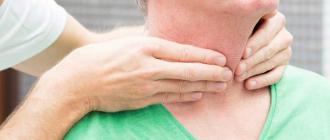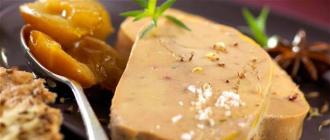What are rich in cottage cheese fish meat eggs. Protein-rich food. Protein intake
When it comes to proper nutrition, everyone begins to unanimously talk about the use of certain amounts of proteins, fats and carbohydrates, but not everyone can immediately determine what foods contain the same proteins, fats and carbohydrates, and in what quantities should they be consumed? To systematize all your knowledge that you already possess to some extent, I will highlight several key aspects and call foods containing proteins, fats and carbohydrates in large quantities per 100 grams. According to its composition, each product from a certain category (be it proteins, fats or carbohydrates) will be richest in the nutrient in the category of which this product is located. I will also highlight good foods containing proteins, fats and carbohydrates and bad when we talk about proper and balanced nutrition. So, let's begin.
Carbohydrates
Carbohydrates should make up 40-50% of the total calorie content of your diet if you are not losing weight, but keep your weight normal, and 30-40% if you are in the process of losing weight. Carbohydrates are the main source of energy for your body. The more active your life, the more carbohydrate foods should be present in your diet. But there is one BUT ...
While carbohydrates do a good thing and provide you with the energy you need for work, exercise, and even recreation, they are also quite insidious. , you need to use it correctly, namely: at a certain time of the day, in certain quantities and certain products. Too many restrictions, you say. But it will not work out differently with carbohydrates, since neglect of these rules will entail:
1) their excess, and this will subsequently lead to excessive storage of fat and the appearance of extra pounds on the scales;
2) their deficiency, which manifests itself in poor health, loss of strength, lethargy and depression, drowsiness and fatigue even at the beginning of the day.
A certain time of day means that it is best consumed in the morning (before 2 pm).
In certain quantities means: consume at least 30% and not more than 50% carbohydrates of the total calories in your diet.
And I present a list of certain products below. It lists some productshigh in carbohydrates per 100 g of product.
Foods containing carbohydrates

It should be remembered that you should give preference to foods containing complex carbohydrates... They are slowly absorbed by your body and do not cause a sharp rise in blood sugar and the release of the hormone insulin, which is the main "fat storage" in the body.
Below I give examples of the "good" complex carbohydrates that should dominate your daily diet, and the "bad" fast carbohydrates that you should, if possible, avoid altogether, or at least not consume often.


We sort of figured out with carbohydrates. The most important thing to remember is:
- Carbohydrates should be 40-45% (for weight maintenance) or 20-30% (for weight loss) of the total calories in your diet.
- Your menu should be dominated by foods containing complex carbohydrates(cereals, wholemeal bread, durum wheat pasta, etc.)
- Minimize your intake of "bad" carbohydrates and foods containing fast carbohydrates(some fruits, sugary drinks and juices, instant cereals, sugar, etc.)
- Eat carbohydrates in the morning.
Squirrels

Protein is the main building block for your muscles and a source of essential amino acids, so proteins should make up 40-45% of the total calories in your diet if you are not losing weight, but are maintaining your weight, and 45-50% if you are in the process of losing weight or .
In this table, you can familiarize yourself with foods that have a high protein content per 100 g.
Protein foods

Proteins are divided into two types: animal and vegetable. Your diet should include foods containing protein both types. But you should know that animal proteins are complete, highly digestible and rich in amino acid composition. Whereas proteins of plant origin, on the contrary, are not completely absorbed by our body and have a poor amino acid composition.
Below are the foods containing animal and vegetable protein.


Remember that a person needs to consume 1.5-3.5 g of protein per 1 kg of weight (a smaller amount will lead to a deficiency, and the body will have to compensate for it from your muscles and organs). This indicator can reach a higher value (5-6 g), but this is the case if you have heavy workouts with iron and your goal is to gain mass. Otherwise, your body does not need such a large amount of protein, since an excess of protein badly affects the liver, kidneys, overloading them with its decay products, and also leads to the accumulation of ketone bodies, which can cause intoxication of the whole body. Therefore, using foods containing protein in large quantities, you need to remember that everything is good in moderation. Protein is your help in creating a beautiful body with prominent muscles, but only if you adhere to the following rules:
- Eat protein, both animal and vegetable, but prefer more foods containing protein animal origin (eggs, fish, cottage cheese, chicken, beef, etc.)
- Get the right amount of protein based on your workout, weight, and calorie intake. The average amount of protein is 2 g per 1 kg of body weight.
- The evening meal should be more protein-rich. Try to consume foods containing protein and steamed, either boiled or baked in the oven.
Fats

Fat is another source of energy, but only more powerful than carbohydrates. Internal fat, together with subcutaneous fat, which we all hate so much and want to get rid of, actually have a number of very important functions in our body:
- fats are the main source of energy during illness and hunger, when the supply of nutrients to the body is reduced or not supplied at all;
- fats contribute to the fact that our blood vessels remain elastic, and through them nutrients easily flow to all cells and tissues of our body;
- fats are responsible for the condition of hair, nails and skin (this is especially important for us girls);
- fats are involved in the synthesis of hormones and are responsible for the normal menstrual cycle in girls;
- fats improve the taste of food, etc.
Fatty foods must be present in your daily diet.
The average amount of fat a person needs is 1 g per 1 kg of body weight. This is approximately 25-30% of the total calorie content of your diet, both for those who are losing weight and for those who do not lose weight.
Fatty foods

Speaking of fats, you should know that there are saturated fats and unsaturated fats. The first category is healthy (good) fats, consuming them in moderation helps the body burn fat! And the second category is unhealthy (bad) fats, the consumption of such fats leads to the accumulation of cholesterol and atherosclerosis.
I provide below a list of foods containing good and bad fats.


So, to summarize with fats:
- Fatty foods it is possible and even necessary! As a percentage of fats, our body should receive 20-30%, in grams - about 1 g per 1 kg (with weight loss, it is possible to reduce it to 0.8 g).
- Consume foods containing healthy unsaturated fats(vegetable oils, nuts, seeds, fatty varieties of sea fish).
- Try to avoid eating fatty foods in the evening.
Well, we figured it out, what foods contain proteins, fats and carbohydrates and in what quantities. Now you know that foods containing carbohydrates, it is better to use in the morning; foods containing protein are important for the growth and recovery of your muscles; a foods containing fats, are responsible for the normal condition of nails, hair and skin. All this must not be forgotten and taken into account when drawing up your menu for the day.
Your coach, Yanelia Skripnik, was with you!
I wish you, dear girls, to eat right and always remain healthy and slim!
Today, in the diet of our compatriots, one can note the presence of a certain deficiency in the consumption of high-grade proteins (), which, in one way or another, are important for every living organism.
But many people do not even suspect that protein is the main building material that takes an active part in the formation of muscle fibers, strengthening hair and nails, and also helps maintain body weight at the proper level.
But, unfortunately, the human body is not endowed with the ability to store proteins for future use, so the only source of them will be the regular consumption of foods rich in protein.
Its daily rate for a person is calculated as follows: with a measured lifestyle, 0.5 g will be enough. pure protein per 1 kg of its own weight, with active sports and a desire to strengthen muscle mass - 2 g, for pregnant women and nursing mothers - about 1 g.
List of high protein foods
1. Meat
Poultry meat is a very good and healthy source of irreplaceable and easily digestible protein (about 20% of the total mass). In addition, such meat, unlike its other types, has a low calorie level, plus a number of essential amino acids, vitamins and minerals.
Beef is practically not inferior in its useful properties to poultry meat and contains about 25% of complete animal protein, it is also rich in essential and non-essential amino acids, B vitamins and iron. For the greatest beneficial effect, it is recommended to use it boiled or stewed.
Veal - meat is rich in complete protein and is much easier absorbed by the body than pork. Subdivided into several categories. The first or the second is best. They contain about 20% healthy protein and no more than 2% fat.
Horse meat is divided into several categories. The most optimal choice is meat of the 2nd category, which has a protein content of 21%, and is also rich in potassium and iron.
Rabbit meat - differs from other species in its taste and special usefulness for the body of each person. This dietary product contains about 21% of complete protein, plus iron, vitamins, potassium, phosphorus and many other useful minerals.
Pork - this product has a minimum of connective fibers, which is why the meat is softer in taste and is very popular with people. But it is not always useful, for example, some varieties of pork have a very high percentage of fat and, conversely, have a low protein content (fat 50%, protein 12%). Therefore, if you decide to lose weight, it is better to refuse such a product in favor of pork tenderloin (protein 20%, fat 7%).

2. Chicken eggs
The next product after meat, which contains a huge amount of complete, easily digestible protein (17%), as well as omega-3 fatty acids, phosphorus, iron, zinc and sulfur. They are especially rich in minerals and fat-soluble vitamins.
Despite the fact that the yolk also contains not entirely healthy fats, experts note that their negative effect on the body is leveled by the presence of such a component as lysine. In addition, it is in the yolk that all the main minerals and vitamins are concentrated!
But in order for them to benefit you, it is best to boil the egg, since with this method of heat treatment it does not lose its basic qualities (due to the presence of the shell).
3. Dairy products
Cottage cheese is an excellent source of complete protein (14 - 18%). But the main thing is to give preference to the fat-free versions of it, which have the lowest number of calories. You can mix it with yogurt or kefir, which will greatly increase its digestibility.
The most suitable time to consume dairy products is the evening, since they contain such a component as casein, which is absorbed by the body for the longest time, unlike other ingredients.
Cheese - refers to foods rich in protein, but it is also very energy-intensive, so you should choose its least high-calorie varieties, for example, feta cheese or feta cheese. It is best to eat cheese before exercise, as the extra calories you get will easily go away with exercise.

4. Fish
Fish is a dietary, very healthy and tasty product. In terms of the presence of proteins, it is practically in no way inferior to meat (on average, about 16% protein). Its highest content is found in tuna, cod, flounder, trout, mackerel, salmon, sardines and anchovies.
In addition, fish contains a huge amount of essential amino acids, and is also rich in iodine, fluorine, potassium, phosphorus, magnesium, vitamins of group B, A, E and D.
Its main advantage is the minimum content of connective fibers, mostly in the form of collagen (gelatin). Because of this, during cooking, fish meat becomes very soft and easily boiled, and protein is more easily absorbed by our body. The only thing is to give up smoked fish.
5. Vegetables and fruits
It is very difficult for a person who is unfamiliar with the information - what foods with a high protein content exist to compose a complete diet for himself. But we will help you with this!
In your daily menu, you should definitely include solid varieties of fruits: pears, mangoes, kiwi, pineapple, as well as fruits with seeds (cherries, apricots and peaches), since they are all rich in vegetable protein.
If you want to tidy up your figure, you also need to eat as many vegetables as possible. For example, there are no calories in Brussels sprouts, but they are very high in protein (about 9%), so their use will be extremely beneficial for your health and appearance.
6. Cereals
This is a great option for a healthy lifestyle. Almost all cereals are very well absorbed by the human body, contributing to better digestion.
For example, lentils. It would seem that it is special, but few people know that it is very rich in protein (200 g. Contains about 18% protein and only 1 g. Fat). Eat porridge - and you will be healthy!

Summary table of protein-rich foods (per 100 g.)
Meat and fish:
| Name | Qty | Name | Qty | Name | Qty |
|---|---|---|---|---|---|
| Beef | 23 gr. | Pork liver | 19 gr. | Anchovies | 24 gr. |
| Mutton | 19 gr. | Heart | 15 gr. | Salmon | 21 gr. |
| Pork | 26 gr. | Lobster | 26 gr. | Sardines | 19 gr. |
| Veal | 23 gr. | Sea bass | 24 gr. | Herring | 18 gr. |
| Rabbit | 24 gr. | Sturgeon | 22 gr. | Tuna | 24 gr. |
| Hen | 22 gr. | Halibut | 19 gr. | Mackerel | 17 gr. |
| Fried duck | 10 gr. | Saida | 24 gr. | Trout | 18 gr. |
| Boiled sausage | 15 gr. | Hake | 15 gr. | Pink salmon | 21 gr. |
| Ham | 13 gr. | Cod | 20 gr. | Salmon | 21 gr. |
| Bacon | 22 gr. | Sprats | 18 gr. | Flounder | 19 gr. |
| Beef liver | 18 gr. | Pollock | 16 gr. | Mullet | 26 gr. |
Eggs:
Dairy products:
Protein is an essential component in the human body. It removes toxins, controls immune processes, builds muscles, bones, cartilage. For high-quality weight loss, it is imperative to include proteins in your diet. Protein-rich foods will help you balance your menu and achieve your goals.
In general terms, foods containing protein are meat, fish, eggs, dairy products, legumes, some vegetables and fruits. The list is quite extensive. But for weight loss, it is imperative to include the "best" in the diet.
We provide a list of leading ingredients in this matter:
- Poultry meat.
Particular attention should be paid to boiled chicken breasts. They contain maximum protein, optimal amount of fat and do not contain carbohydrates. Also, this part of the chicken is rich in vitamins and minerals. - Beef, veal and other types of meat.
These protein-rich foods are also low in calories. One hundred grams of veal will bring into the body 21 g of proteins, beef - 20 g. For weight loss, it is better to choose calf meat aged 1-2 years. Horse and rabbit meat is also beneficial. - A fish.
In this category, salmon and tuna with 24% protein rank first, followed by pink salmon (22%). Pike, hake, cod, carp, perch, shrimp and crabs should not be neglected. Remember also about caviar, it contains about 30% proteins, phosphorus, potassium. - Egg white.
This is the king of all proteins! It is the reference protein because it is absorbed better than others in the body and has the maximum benefit. One egg contains about 7 grams of building material. - Cheese.
These products are rich in proteins, with a low fat content (up to 15%), they have 25-30% of proteins. Fatty varieties are also good, only they are characterized by a fairly high calorie content.
In order to lose weight or build muscle, you should definitely include ingredients from the top 5 in your menu. But diversity is the key to success. Therefore, the list of foods that are high in protein continues.
We introduce other goodies into the diet
 During weight loss, especially on low-carb diets, many people break down precisely because they eat only chicken breasts or eggs. You shouldn't harass yourself like that. Experience the pleasure of dieting by introducing delicious foods that contain protein.
During weight loss, especially on low-carb diets, many people break down precisely because they eat only chicken breasts or eggs. You shouldn't harass yourself like that. Experience the pleasure of dieting by introducing delicious foods that contain protein.
So, we continue the list:
- Cottage cheese.
In the summer season, mix it with strawberries and you will experience this rich taste and aroma. Dessert is much healthier than store sweets. Only with berries you need to be careful, because they also contain carbohydrates. - Meat by-products.
Stewed liver with vegetables, tongue or heart have high nutritional values. - Soy products contain 40-50% protein by weight.
Comparatively not as high-quality as chicken protein, especially for muscle building and weight loss, but texturates and soy are alternatives for vegetarians. - Cereals.
Try quinoa, which contains up to 18% protein. Not too far behind buckwheat and millet groats, followed by semolina and oatmeal. Rice accounts for only 2 to 6% of proteins, depending on the variety. Porridge is also rich in carbohydrates. When combined with vegetables, they stimulate the intestines, which is important when the diet is rich in protein foods. - Brussels sprouts.
It is not only a source of protein, but also contains vitamins, is low in calories and 0% fat. This is the main vegetable for losing weight and treating various diseases, including tumor ones.
We have listed delicious and healthy protein-rich foods. But most of them are of animal origin, which is not suitable for some population groups. It is possible and even necessary to solve this problem.
How to compensate for the lack of protein in vegetarians?
 If a vegetarian analyzes the above list of ingredients, then out of 10 positions he will be able to afford only 3. Too little, you say. And we agree with that.
If a vegetarian analyzes the above list of ingredients, then out of 10 positions he will be able to afford only 3. Too little, you say. And we agree with that.
Vegetarians are encouraged to include lentils, soybeans, broccoli, onions, asparagus, and paprika in their menu. Couscous groats and wheat germs have good indicators. From fruits and vegetables, spinach, avocado, banana have proven themselves well (but it is not very good for losing weight).
Look for Brazil nuts in the supermarket - a very nutritious and healthy product. Almonds, hazelnuts, sunflower seeds and pumpkin seeds are also important to consume at least a few times a month. In addition, they will saturate the body with healthy fats. America's favorite food, peanut butter, will also deliver protein to tissues.
Seitan is a popular product among vegetarians. It is made from wheat gluten, which absorbs the flavors of the dishes that are cooked nearby. One hundred grams of this "meat" contains 57 g of protein. It can successfully replace duck and chicken.
Tofu and tempeh cheeses are important for quality weight loss and healthy functioning. They can be fried, marinated, added to soups, mashed and even cooked like a steak, frying a whole rectangle in spices.
Green soybeans in pods are also popular with vegetarians. It is a healthy and nutritious snack. Only now there is relatively little protein in it - about 7 g / 100 g.
We also advise vegetarians to consume quinoa (pseudo-grain plant), zucchini, hummus, black beans, green peas. With them, you can cook many incomparable dishes, you just need to show your imagination. Since all of these foods contain a minimum of fat, this way of eating is very good for losing weight.
And here you will find
Adequate protein intake is essential for muscle building and post-workout recovery. Proteins are involved in fat burning metabolism and reduce hunger.
In addition, protein slows down the release of carbohydrates into the bloodstream, which will help prevent blood sugar spikes that stimulate fat storage and lower vital energy levels.
The average person needs at least 1 g of protein for every pound of body weight to maintain muscle mass.
Protein consumption for muscle building needs to be increased 2-3 times. To reach this value, you need to fill your grocery basket with high protein foods.
Animal products
Many animal products contain the full range of essential amino acids.
These foods are generally low in carbohydrates, but the fat content may vary.
- Eggs... One large egg contains about 6 g of protein - this is almost ideal food for growing muscles, since its bioavailability (i.e. how much protein from food can be absorbed by the body) is higher than in any other product. However, egg yolk is high in fat, so it is best to separate it from the proteins to reduce the amount of fat in the diet.
- Pork... High quality pork protein supplies the body with the branched chain amino acids (BCAAs) to help your muscles maximize recovery after exercise. Choose a lean fillet for grilling or oven-proof steak - this will provide 1 g of protein for every 7-11 calories of meat.
- Beef... In addition to protein, beef is a source of creatine and iron, which help muscles function properly. Limit yourself to 5% fat lean cuts of meat.
- Skinless chicken or turkey breasts... White meat from chicken and turkey provides more protein than other parts of the poultry with a minimal fat content, so this product should be on your menu.
Dairy products
 Among dairy products, there are many options with different fat content.
Among dairy products, there are many options with different fat content.
Fat should not be completely eliminated - its absence will interfere with the absorption of fat-soluble vitamins and calcium, which are good for bone health.
- Cottage cheese... This food is loaded with casein, a slow-breaking protein that supplies your growing muscles with essential amino acids.
- Yogurt... In addition to the protein component, yogurt is rich in probiotics that will help the intestines to function properly. Choose yogurt without additives or sugar.
- Cheese... Be careful - in addition to protein, cheese contains a significant amount of fat. Choose a low-fat hard cheese.
- Milk... This product is a premium whey protein source with slightly less bioavailability than eggs. Choose 2% milk for an optimal balance of fat and protein.
Fish and seafood
 Seafood is a great source of protein as it is almost fat-free.
Seafood is a great source of protein as it is almost fat-free.
Fish contains fat, but it is rated as good for the body due to the presence of omega-3 fatty acids.
- Tuna... This fish is highly digestible and contains premium quality protein. You will also receive a set of B vitamins and a powerful dose of the antioxidant selenium with tuna.
- Halibut... Among white fish, halibut contains an optimal ratio of microelements necessary for the body. Pacific halibut is generally more biologically valuable than Atlantic halibut.
- Tilapia... This fish contains a noticeable amount of protein combined with a mild, delicate taste.
- Salmon... Red fish is quite fatty with a high protein content. However, the omega-3 fatty acids in it help fight fat storage.
- Shrimps... This product contains high quality protein with a minimum amount of fat and carbohydrates, as well as B vitamins and iron.
Herbal products
 Plant foods, along with protein, contain a significant amount of carbohydrates.
Plant foods, along with protein, contain a significant amount of carbohydrates.
Vegetable protein provides an incomplete spectrum of amino acids, so it is ideal to use such products as a side dish for meat or poultry. This is a great way to boost your protein intake as well as fiber and a range of vital minerals.
- Lentils... In addition to protein, lentils are a source of iron, molybdenum, and folate, which are essential for muscle fiber function.
- Buckwheat... A healthy food that improves blood circulation, lowers cholesterol and controls blood glucose levels.
- Legumes... Soybeans, beans and peas are rich in protein; soybeans are ahead of even meat in the amount of protein. Add legumes to soups, salads, and meat dishes.
- Tofu... Soy cheese is a concentrated source of all the proteins provided by soy. It can be added to salads, grilled, or fried with eggs.
- Quinoa... This whole grain product contains iron, magnesium and manganese in addition to protein.
- Nuts... Walnuts, cashews, almonds, along with a high protein content, are rich in healthy fats. Choose a small amount of unsalted nuts for a snack or to add to a salad.
High Protein Foods Ranking
The foods in the table are ordered by protein content per 100 grams of uncooked food. When choosing, pay attention to the quantitative ratio of proteins and fats.
| A place | Product | Protein content per 100 g of raw product | Protein: Fat Ratio | Calorie content |
| 1 | Soy | 35 | 2:1 | 381 |
| 2 | Pork | 27 | 2:1 | 242 |
| 3 | Beef | 26 | 5:3 | 250 |
| 4 | Cheese | 26 | 1:1 | 360 |
| 5 | Chicken breasts | 23,6 | 25:2 | 113 |
| 6 | Tuna | 23 | 23:1 | 101 |
| 7 | Lentils red | 21,6 | 20:1 | 314 |
| 8 | Tilapia | 20 | 12:1 | 96 |
| 9 | Salmon | 20 | 3:1 | 142 |
| 10 | Nuts | 20 | 2:5 | 607 |
| 11 | Shrimps | 19 | 17:2 | 95 |
| 12 | Halibut | 19 | 6:1 | 102 |
| 13 | Curd 5% | 17,2 | 7:2 | 121 |
| 14 | Turkey breasts | 17 | 10:1 | 104 |
| 15 | Egg yolk | 16 | 4:7 | 322 |
| 16 | Quinoa | 14,1 | 5:2 | 368 |
| 17 | Eggs | 13 | 6:5 | 155 |
| 18 | Buckwheat | 12,6 | 4:1 | 313 |
| 19 | Egg white | 11 | 55:1 | 52 |
| 20 | Red beans | 8,4 | 28:1 | 93 |
| 21 | Tofu | 8,1 | 2:1 | 73 |
| 22 | Peas | 5 | 25:1 | 73 |
| 23 | Yogurt 2% | 4,3 | 2:1 | 60 |
| 24 | Milk 2.5% | 2,7 | 1:1 | 52 |
The article is not considered
Nutrition should be varied and balanced, this allows you to ensure the intake of all the necessary substances into the body. Proteins play an important role; without them, the body simply cannot function normally. What protein-rich foods should you eat?
Why do all nutritionists vying with each other about the fact that it is imperative to include protein-rich foods in your diet? What do proteins give to our body? Here are some of their functions:
- Protein is a building block for almost all tissues. It is found in blood, muscles, hair, nails, skin, internal organs and tissues. Protein food is used by athletes, as it allows you to effectively and quickly build muscle mass.
- Protein helps to bind nutrients and nutrients and deliver them to cells. Without this component, such transportation would not have been possible.
- Protein molecules are involved in the formation of cells of the immune system and strengthen the immune system.
- Proteins are part of special enzymes that catalyze (that is, accelerate) some important biochemical reactions in the body. With a lack of protein, metabolism will slow down. And with a slowed down metabolism, there will certainly be an excess of body weight. That is why protein products are included in the menu of various weight loss diets.
Daily protein requirement

A measure is needed in everything. Although protein is incredibly useful and necessary for the body, it must be consumed in certain quantities.
So, an ordinary person leading a normal lifestyle requires about 1 gram of protein per 1 kilogram of weight per day.
If the lifestyle is sedentary, then 0.5 grams will be enough. If the profession is associated with intense stress, then the rate increases to 2 grams. And athletes are advised to consume about 3 grams of protein per 1 kilogram of weight.
What protein should I eat?
Proteins can be plant and animal. The first group includes the protein found in meat, fish, eggs, and dairy products. The second group consists of products of vegetable origin, that is, vegetables and legumes.
About 15-20% of the substances contained in food (meaning proteins, fats and carbohydrates) should be made up of proteins. To make them better absorbed, nutritionists recommend about 70-80% animal protein and 20-30% vegetable protein.
What foods contain protein?
What foods contain the most protein? We suggest studying the list:

Other protein-rich foods can be included in the list, but their content of this component is not as significant as those listed.
What protein is better absorbed?

Different types of protein are absorbed by the body in different ways. In general, such a food component begins to be processed in the digestive tract, and that is why plant foods are not the best option.
The fact is that they contain a significant amount of fiber, which reduces absorption and literally immediately removes everything in a natural way. Meat products, however, are good sources. Of these, protein is absorbed better.
But many nutritionists believe that dairy products and eggs are the best options. It is a light food with an easily digestible protein content. The content of this component is not so high, but it is absorbed almost completely.
In order for proteins from food to be absorbed best of all and bring only benefits, you need to follow some recommendations when eating foods:

Eat protein foods, but know when to stop. Also, stick to eating rules that will help you get the most out of your food.





